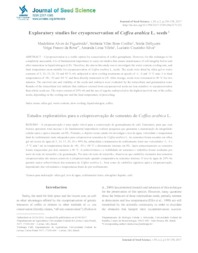Exploratory.
Exploratory.
Autoria: FIGUEIREDO, M. A. de; COELHO, S. V. B.; ROSA, S. D. V. F. da; VILELA, A. L.; SILVA, L. C.
Resumo: Cryopreservation is a viable option for conservation of coffee germplasm. However, for this technique to be completely successful, it is of fundamental importance to carry out studies that ensure maintenance of cell integrity before and after immersion in liquid nitrogen (LN). Therefore, the aim in this study was to investigate the water content, cooling rate, and final temperature most suitable for cryopreservation of Coffea arabica L. seeds. The seeds were dried by silica gel to water contents of 5, 10, 15, 20, 30 and 40 % wb, subjected to slow cooling treatments at speeds of -1, -3 and -5 °C min.-1 to final temperatures of -40, -50 and -60 °C and then directly immersed in LN. After storage, seeds were rewarmed at 40 °C for two minutes. The survival rate and viability of the seeds and embryos were evaluated by the tetrazolium and germination tests. Results of the tetrazolium test indicate that embryos excised from cryopreserved seeds are less sensitive to cryopreservation than whole seeds are. The water content of 20% wb and the use of zygotic embryos led to the highest survival rate of the coffee seeds, depending on the cooling rate and the final temperature of precooling.
Ano de publicação: 2017
Tipo de publicação: Artigo de periódico
Unidade: Embrapa Café
Palavras-chave: Café, Coffee, Liquid nitrogen, Nitrogênio líquido, Resfriamento lento, Slow cooling, Teor de água, Water content, silica gel
Observações
1 - Por padrão são exibidas publicações dos últimos 20 anos. Para encontrar publicações mais antigas, configure o filtro ano de publicação, colocando o ano a partir do qual você deseja encontrar publicações. O filtro está na coluna da esquerda na busca acima.
2 - Para ler algumas publicações da Embrapa (apenas as que estão em formato ePub), é necessário ter, no celular ou computador, um desses softwares gratuitos. Sistemas Android: Google Play Livros; IOS: iBooks; Windows e Linux: software Calibre.
Acesse outras publicações
Acesse a Base de Dados da Pesquisa Agropecuária (BDPA) para consultar o acervo completo das bibliotecas da Embrapa.

